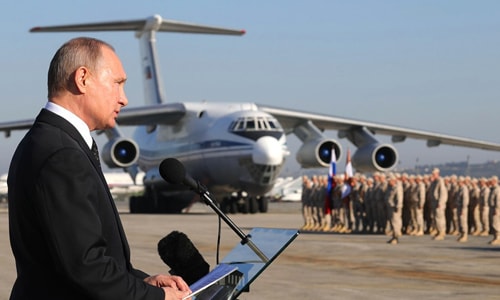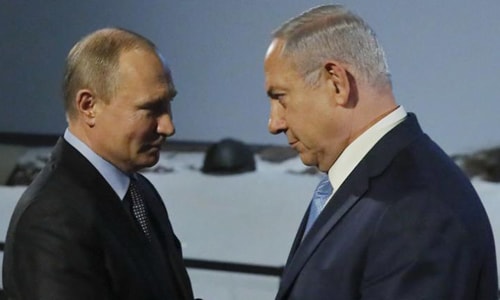Putin's dilemma on the Syrian battlefield
The confrontation between Iran and Israel in Syria could destroy Russia's strategic calculations, forcing Putin to make difficult choices.
|
President Putin speaks to Russian soldiers in Syria in December 2017. Photo:Tass. |
When he launched his military campaign in Syria in 2015, Russian President Vladimir Putin seemed to have a very clear strategic goal: Stabilize Syria, rescue the regime of President Bashar al-Assad and balance the opposing interests of Iran and Israel in this war-torn country, according toHaaretz.
In December last year, he made a surprise visit to Syria, declaring that Russia’s mission there had been accomplished and announcing plans to withdraw most of its troops. However, commentator Anshel Pfeffer said that subsequent events showed that Putin had declared victory too soon, when things in Syria were starting to slip away from the Russians.
Russia had high hopes for a peace conference in Sochi last month, where the sides were expected to discuss a political process for Syria’s future that would preserve Assad’s position. But the conference collapsed before it began when Turkey, a key negotiator, launched a military offensive against Kurdish militias in northern Syria.
The operation plunged Syria into a new spiral of conflict, as the Kurds asked the Syrian government army to send troops to Afrin to help them defend their territorial integrity against Turkish military action. As Syrian army units entered Afrin, Turkey fired warning shots.
More worrying for Russia is the situation in eastern Syria, where the Syrian Democratic Forces (SDF) fighting against Mr Assad's regime are expanding their control over areas abandoned by the self-proclaimed Islamic State (IS) militants.
The expansion of the SDF under US backing has inevitably led to clashes with the Syrian army and pro-Assad forces. In a confrontation nearly two weeks ago between pro-Syrian units and the SDF, US airstrikes killed hundreds, including dozens of Russian citizens fighting in Syria as mercenaries.
But what is happening on the eastern front does not really worry Putin, because the SDF has not yet directly threatened Russia's main interests in Syria. The conflict between Israel and Iran is what puts Russia in a "dilemma", because it could be a big threat to the regime of Mr. Assad, Putin's close ally.
For the past two and a half years, the deal between Russia and Israel has been simple: Tel Aviv agreed to let Moscow support the Assad regime with airstrikes against rebels and insurgents. In return, Russia would turn a blind eye to Israeli fighter jets bombing convoys and weapons depots belonging to the pro-Iranian Hezbollah militia in Syria.
Iran, meanwhile, has been a key ally of Russia in its efforts to shore up Assad’s regime. Russia has been unable to send ground troops to the Syrian battlefield, leaving Hezbollah militias and Iran’s Revolutionary Guard Corps (IRGC) to play a major role in retaking territory from IS militants and rebel groups.
So when Israeli Prime Minister Benjamin Netanyahu asked Russia to prevent Iran from building permanent bases in Syria, Putin sought a “mutually satisfactory” compromise. Iran would continue to build up its militias in Syria, but would not come too close to the Israeli border or establish large bases there.
|
Russian President Putin (left) and Israeli Prime Minister Netanyahu. Photo:Sputnik. |
The strategic balance between Israel and Iran that Putin has worked to build is fragile. Everything almost collapsed when the IRGC sent a drone into Israeli airspace on February 10, forcing Tel Aviv to retaliate by sending F-16 fighters to attack Iranian military facilities in Syria.
Syrian air defense forces, with the encouragement of Iran, fired a missile and shot down an Israeli F-16 fighter jet. When the fighter jet crashed and Israel's retaliation began, it was also the moment when Russia lost control of the interests of all parties in Syria.
Tel Aviv threatens to take strong measures against the Syrian army, even opening a new war. This directly threatens the survival of the Assad regime, as the capital Damascus is very close to the Israeli border.
A major war between Israel and Syria was only averted when Putin called Netanyahu, asking Israel to avoid moves that could lead to a “new dangerous spiral in the region.” After the phone call, Israel stopped talking about military options to attack Iranian and Syrian forces.
According to commentator Pfeffer, this shows Russia's real influence in the region, but also shows that any incident on the ground could destroy Moscow's strategic calculations in Syria, where Russia has invested a lot of effort and resources.
The Israeli intelligence community is also divided on the issue. Some believe Putin will act to contain Iran to protect the Assad regime from the Israeli threat, while many Tel Aviv officials believe Putin will not be able to turn his back on pro-Iranian forces that are so important in Syria. That could force Israel to either stand idly by and watch Iran and Hezbollah build up forces right next door, or face off against the Russians themselves.
Analysts believe that Israel will not risk a direct clash with Russia, as the confrontation with Iran is already a headache for them. However, expert Itamar Rabinovich of the Brookings Institution said that Tel Aviv is always aware that the relationship it is building with Moscow to prevent a confrontation in Syria could collapse at any time due tounexpected incidents on the battlefield.
Sooner or later, Putin will have to choose between Israel or Iran, or else he will lose everything he has invested in Syria, Pfeffer said.



